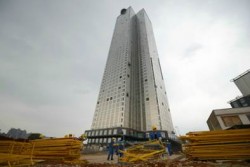A Chinese construction company has built the world's tallest prefab tower in under three weeks of work time.
China is taking the lead in the further development of cutting-edge construction techniques, as part of efforts to expedite the creation of a vast swathe of fresh building stock to deal with the country’s mass urbanisation drive.
Hunan-based Broad Sustainable Building (BSB) serves an outstanding example of this trend, with vice-president Xiao Changgeng claiming that its refinement of prefabricated construction techniques has made it the fastest building company in the world.
BSB recently managed to finish a 57-storey skyscraper within three weeks of work time by taking advantage of the reduced construction times made possible by prefab building methods.
The Mini Sky City, situated in the Hunan province capital of Changsha, is a multi-functional building complex containing 800 apartments, 19 atriums, and enough office space to accommodate 4,000 workers.
BSB assembled the entire structure in the space of just 19 working days via the use of modular construction methods, building upwards at a rate of three storeys per day.
"This is definitely the fastest speed in our industry," said Xiao.
Work on the building was staged in two separate chunks as a result of inclement weather, with the first 20 storeys finished in 2015 and final 37 completed during the first half of February.
The erection of the skyscraper itself was preceded by four and a half months work spent assembling the 2,736 modules that comprise the building prior to actual on-site construction.
Aside from reductions in labor and equipment expenses made possible by the extremely brief build time, BSB claims that the use of modular construction techniques enabled it to cut save 15,000 truckloads of concrete as compared conventional methods.
Prefab building methods also benefited Changsha's air quality during the construction process, as the assembly of the modules involved the release of only minimal amounts of dust into the atmosphere.
In addition to prefab building China has also emerged as a frontrunner in the field of construction using additive manufacturing techniques. Jiangsu-based Winsun has made claims similar to those of BSB with respect to the creation of multi-storey structures at record-breaking speeds, although in its case by adapting 3D printing methods for construction purposes.
China is in urgent need of quicker, cheaper and more sustainable construction methods, in order to provide accommodation solutions for what is set to be the largest urbanisation drive in human history.
A staggering 100 million rural residents are expected to flock to China's cities over the next decade, in a process that could potentially place immense strain upon existing infrastructure and building stock, as well as take a heavy toll upon the environment.
Chinese advocates of innovative building techniques such as prefab construction are hopeful that their adoption will enable the country to create a huge amount of new building in less time for lower cost, while at the same time minimising environmental impact.
Prefabricated building techniques are rapidly becoming more popular in other markets for the same reasons that they’ve been taken up with such enthusiasm by the Chinese.
According to Sarah Bachmann, CEO of the National Precast Concrete Association Australia (NPCAA), the deployment of prefab building methods can significantly reduce building time compared to standard construction, which translates into major cost savings.
"We estimated that at least a 35 per cent reduction in build time can be achieved, which translates into cost savings from less labour, equipment hire and site time," said Bachmann to Sourceable. "Earlier completion of the building also means faster returns on investment – you can get tenants in sooner."
Bachmann also points to the sustainability and efficiency merits of off-site construction, noting that it can virtually eradicate wasted material costs as "there is no waste with precast."
"A precast project means less time on site, less equipment, less third party trades and a cleaner, safer site with less waste and less disruption to surrounding properties," said Bachmann.
Source: Sourceable Net









